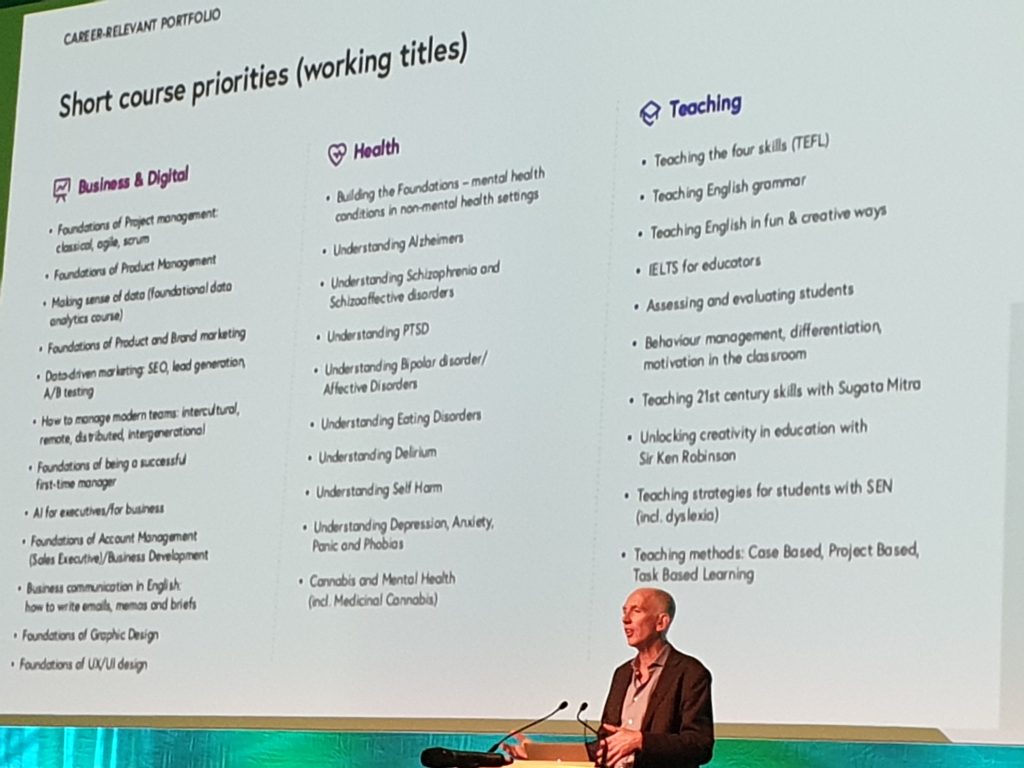The first key note of the World Conference on Online Learning was Simon Nelson Head of FutureLearn (FL), and below is a summary of the key points made by Simon in a thought provoking presentation. 
Simon introduced himself in Irish by going to a free FutureLearn course (Irish 101) and listening to and repeating audio clip of how to say Hello in Irish!
First up the figures….
FL was founded 7 years ago as a commercial offshoot of the Open University and was a UK response to the rise of MOOC’s. FL has 175 partners (32 UK Universities), 2000 ‘courses’, 10 million registered users and 25 million enrollments with some courses with over a million enrollments (English Language Proficiency) and others with 20-30. Simon stated that FL was ‘scratching the surface….’
He highlighted that FL has just become a partner of SEED who have invested $50 million into FL
He identified three key issues
- World Reports highlight that 13.9 million new students per year until 2030 are needed which in traditional money would equate to 700 new universities of 25,000 per university to meet the demand and concluded that physical campus based education CANNOT meet this demand, but online learning CAN.
- Acknowledgement of a Global Skills Gap (especially in Digital Skills) with 14% of the global workforce (375 million) switching job categories – so the need for training/retraining is massive
- Governments starting to get in on the act e.g. UK government ‘Get Help to Retrain’ 2019 initiative.
The above represent opportunities for universities to rethink their audience and move beyond the 18-24 market and that’s what FL is trying to do, support Universities and other providers on this.
Simon concluded by identifying key current agendas for Future Learn.
- Getting partners to work together – scale is so big, it has to be approached via collaboration eg Deakin and Coventry now offer an MA Entrepreneurship
- Unbundling of big degrees, so students can study for a few weeks to a few years
- Work on micro credentialing… short courses approved by employers with standardised credentialing are necessary. FL is doing significant work on micro credentialing aligning for example the European Credit System and the US credit system, so a common language of credit can be used for all courses offered
I came away from the key note with the following thoughts/questions..
As Staffordshire University moves forward as a digitally connected university, we need to look at the markets we wish to tap into.
- Should we be offering a far greater variety of online ‘chunks of learning’ to meet employer demands for training and especially re-training?
- Do we need to move toward credentialing/micro credentialing for each and every online/blended unit that we offer?
- Do we want to attract students from beyond the region and can we do this by ourselves, or do we need to consider collaboration with other universities in online settings ( virtual/transnational!!)
- Do we need to be looking for agencies (such as FL) to support attempts to offer learning not just to regional audiences but to national and international audiences.
- If any of the above is considered necessary, how can we best use the pockets of expertise that we have in delivering blended and online content to learners to move some/all of the above forward.

